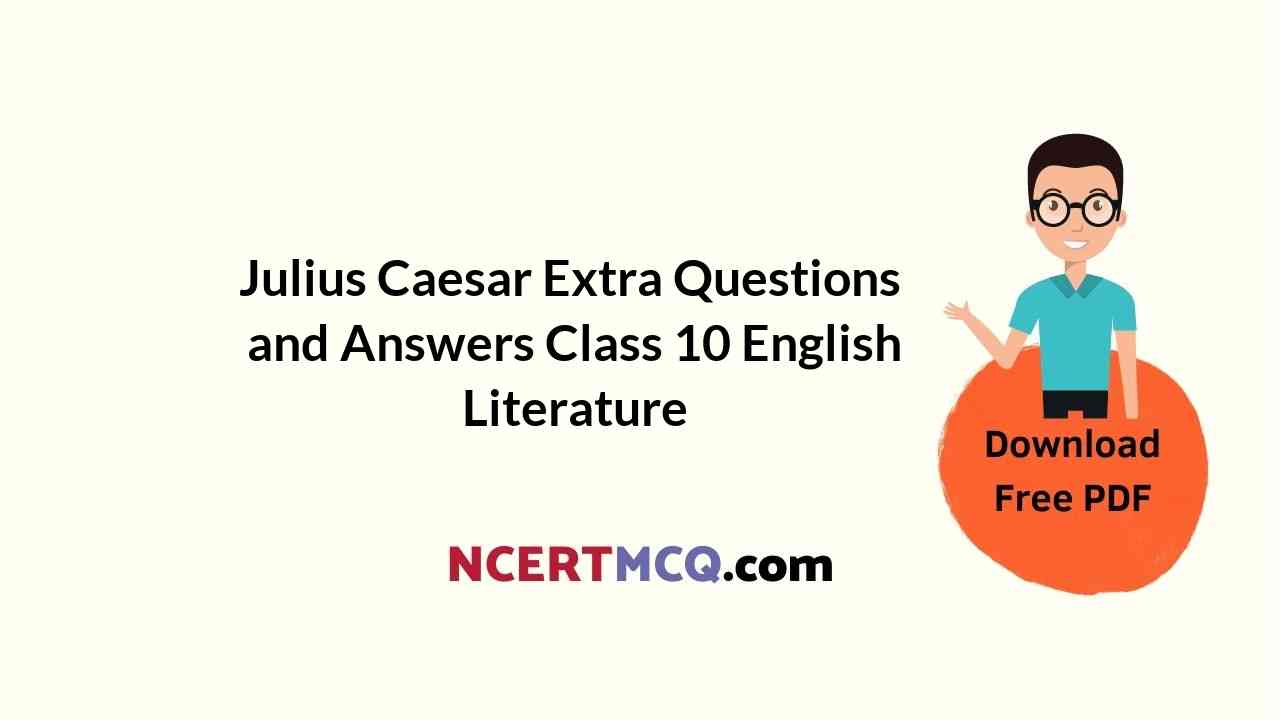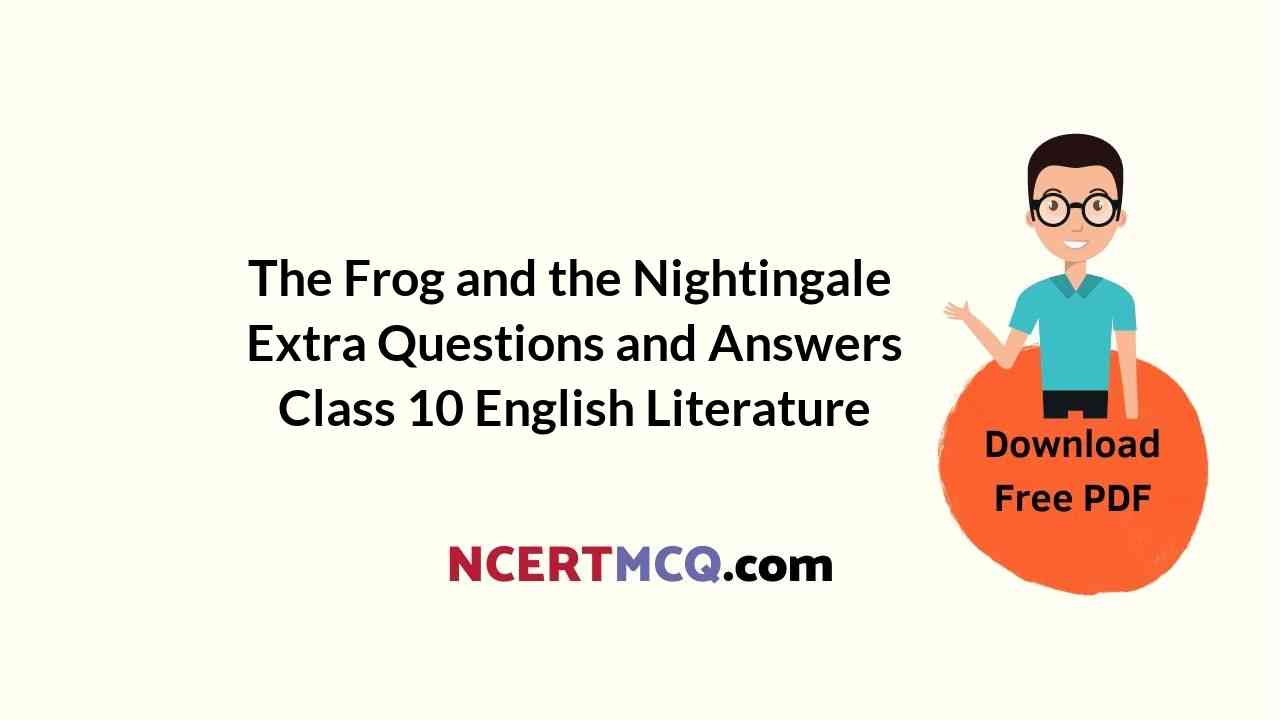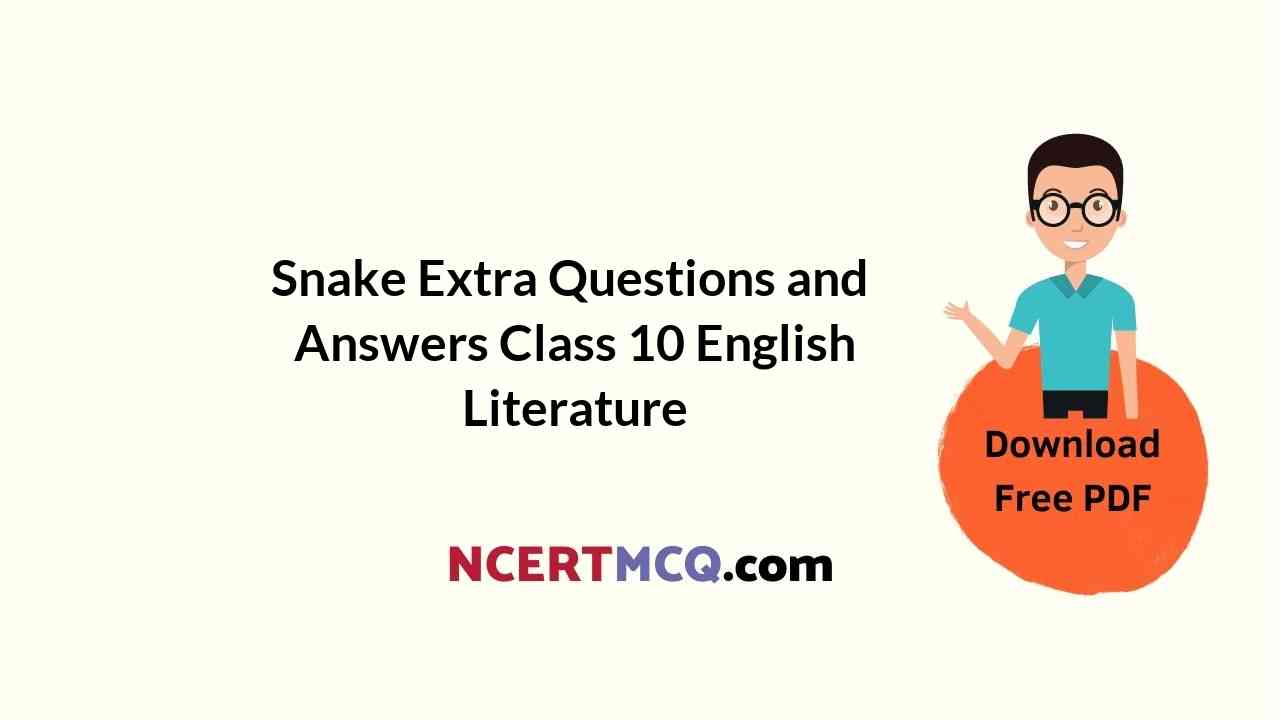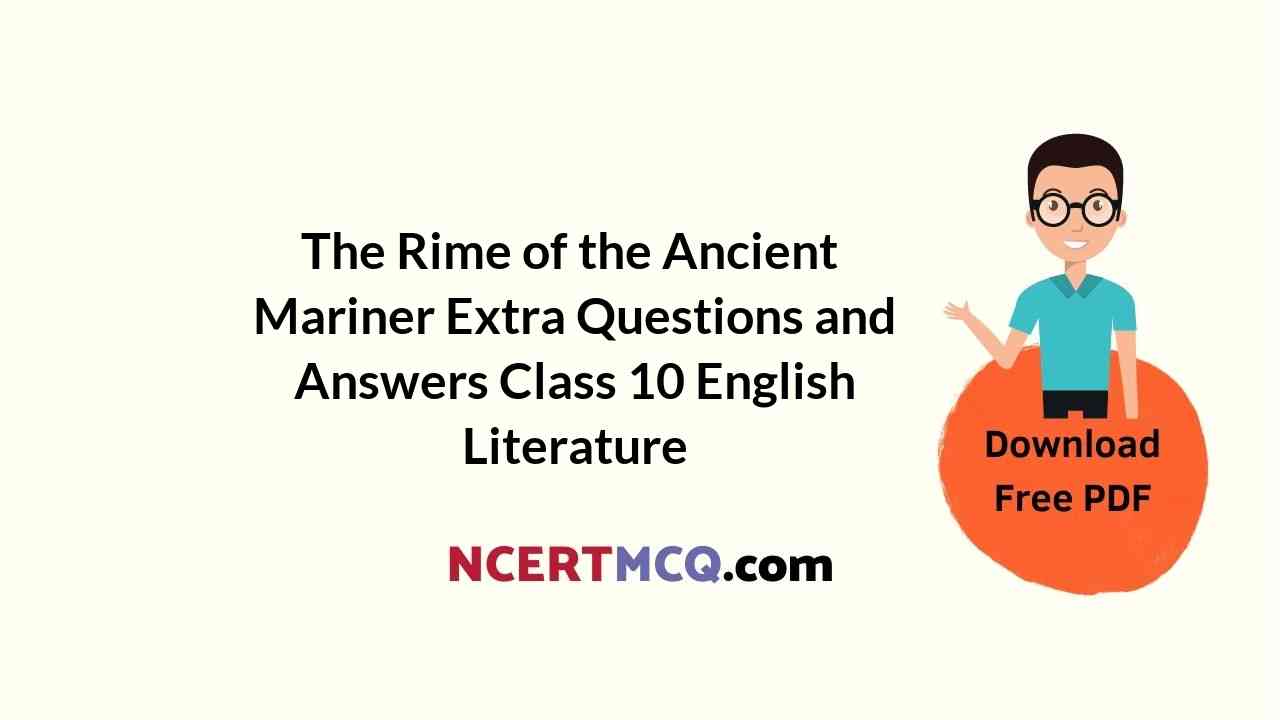Here we are providing Julius Caesar Extra Questions and Answers Class 10 English Literature Reader, Extra Questions for Class 10 English was designed by subject expert teachers. https://ncertmcq.com/extra-questions-for-class-10-english/
Julius Caesar Extra Questions and Answers Class 10 English Literature
Julius Caesar Extra Questions and Answers Short Answer Type
Julius Caesar Short Questions And Answers Question 1.
How do the heavens ‘blaze forth’ the death of Julius Caesar?
Answer:
The heavens sent omens foretelling a major calamity—like Calpumia’s dream of Caesar being murdered, a lioness whelping in the streets, graves opening and dead bodies lying around, warriors fighting upon the clouds and drizzling blood upon the Capitol, horses neighing, dying men groaning and ghosts shrieking about the streets.
Julius Caesar Questions And Answers Icse Question 2.
Why does Calpurnia say Caesar’s ‘wisdom is consumed in confidence’? What does she mean?
Answer:
Calpumia means that though Caesar is wise, he is overconfident. His wisdom is destroyed by his overconfidence.
Julius Caesar Questions And Answers Question 3.
What did Calpurnia dream about Caesar? How did Decius Brutus interpret the dream?
Answer:
Calpumia dreamt she saw Caesar’s statue spout blood like a fountain and Romans came smiling and dipped their hands in the blood. She saw the dream as a warning that danger was imminent. Decius Brutus interprets the dream as a lucky vision. He said it signified that from Caesar, Rome shall imbibe fresh life and great men will earnestly desire relics marked with his blood.
Julius Caesar Question And Answer Question 4.
What are the arguments put forward by Decius Brutus to convince Caesar to go to the Capitol?
Answer:
Decius flatters Caesar into disregarding the fears of his wife. He says that the Senate decided to offer a crown to Caesar that day and if he does not go they may change their minds and mock him for being afraid. They may say that the Senate should be dismissed till Caesar’s wife has better dreams.
Julius Caesar Important Questions Question 5.
Why is Decius more successful than Calpurnia in persuading Caesar?
Answer:
Decius is more successful than Calpurnia in persuading Caesar because he appeals to Caesar’s ambition and vanity.
Julius Caesar Questions And Answers Pdf Question 6.
What is the petition put before Caesar by the conspirators? How does Caesar respond to it?
Answer:
The conspirators want Caesar to recall the order of exile passed against Metellus Cimber’s brother, Publius. Caesar refuses to listen to them and change his mind.
Julius Caesar Question Answer Question 7.
Who says ‘Et tu, Brute’? When are these words spoken? Why?
Answer:
Caesar says these words just after Brutus stabs him. Caesar loved Brutus and could not believe Brutus would do such a deed.
Julius Caesar Question Answers Question 8.
In the moments following Caesar’s death, what do the conspirators proclaim to justify Caesar’s death?
Answer:
The conspirators proclaim that they killed Caesar to free Rome of him and to establish democracy— ‘Liberty, freedom, and enfranchisement! ’
Julius Caesar Questions And Answers Class 10 Question 9.
Seeing the body of Caesar, Antony is overcome by grief. What does he say about Caesar?
Answer:
Antony is saddened that the great conqueror Caesar is reduced to a dead body lying on a small piece of the ground. He expresses willingness to die at the conspirators’ hands while their hands and weapons are still warm with Caesar’s blood.
Julius Caesar Play Questions And Answers Question 10.
Whom does Antony call ‘the choice and master spirits of this age’? Why?
Answer:
Antony calls the conspirators—Brutus, Cassius and the others as ‘the choice and the master spirits of this age.’ He is actually mocking them beneath his pretence of flattery.
Julius Caesar Questions Question 11.
How do Brutus and Cassius respond to his speech?
Answer:
Brutus tells him not to beg for his death at their hands. He says that he killed Caesar for he loved Rome more than he loved his friend. Cassius, on the other hand, appeals to Antony’s greed and says that he will have a say in the new government.
Question 12.
Why does Cassius object to allowing Antony to speak at Caesar’s funeral? How does Brutus overcome this objection?
Answer:
Cassius fears Antony and his ability as an orator. Brutus says he will speak first and tell the citizens that Antony was speaking with their permission.
Question 13.
What are the conditions imposed by the conspirators before allowing Antony to speak at Caesar’s funeral?
Answer:
While speaking of Caesar’s greatness, Antony must not blame the conspirators for murdering Caesar. He must also say that he has been permitted to speak at Caesar’s funeral by the conspirators. Moreover, he must speak from the same pulpit as Brutus.
Question 14.
When he is left alone with the body of Caesar, what does Antony call Brutus and the others?
Answer:
Antony calls them butchers.
Question 15.
What prediction does Antony make regarding the future events in Rome?
Answer:
Antony predicts that Italy will be cursed as civil war shall break out; bloodshed, destruction and dreadful sights will become so familiar that mothers shall smile when they see their infants killed in war, pity will be destroyed due to foul deeds becoming common. Caesar’s spirit shall roam about for revenge, dead bodies will be lying around rotting and stinking and there will be no one to give them a decent burial.
Question 16.
What reasons does Brutus give for murdering Caesar?
Answer:
Brutus says that Caesar was ambitious. Brutus loved Rome and that it stands for more than just Caesar.
Question 17.
Who says, ‘Let him be Caesar’? What light does this throw on the speaker?
Answer:
One of the citizens says this after Brutus’ speech. He has not understood the reasons Brutus has given for Caesar’s murder.
Question 18.
Why is Antony’s speech more effective?
Answer:
Brutus’ straightforward appeal to logic and reason versus Antony’s appeal to emotion through the use of irony, sarcasm and reiteration, is more effective.
Question 19.
At the end of the scene what is the fate of Brutus and Cassius?
Answer:
Brutus and Cassius are attacked by the mob who rush to set fire to their houses.
Question 20.
Why does Calpurnia urge Caesar not to step out of the house?
Answer:
Many bad omens had been witnessed during the night. The watchmen had seen strange sights. A lioness had given birth to her young ones in the streets, graves had opened and ghosts had been heard shrieking in the streets. Fierce battles had been fought in the clouds and the blood of the soldiers had fallen on the Capitol. Calpurnia herself had seen a horrible dream in Caesar was being murdered and Romans were bathing their hands in Caesar’s blood. Frightened by these sights and her dream, Calpurnia urged Caesar to stay at home as these happenings foretold the death of a great person.
Question 21.
Why does Caesar make the following remark, ‘Cowards die many times before their deaths’?
Answer:
Caesar makes the above statement to calm Calpurnia’s fears. Frightened by bad omens and her dream, Calpurnia urged Caesar to stay at home as these omens predicted the death of a great person. Caesar tells Calpurnia that while cowards imagine their death frequently, thus dying in their minds several times over, brave men, refusing to dwell on death, die only once. He cannot understand why men fear death, which must come eventually to all. Caesar maintains that he will not stay at home out of fear.
Question 22.
How does Decius interpret Calpurnia’s dream about Caesar’s murder?
Answer:
Calpurnia, in her dream, had seen a statue of Caesar spouting blood from a hundred places and many Romans bathing their hands in it. Decius told Caesar that Calpurnia had completely misinterpreted her dream.
Caesar’s statue gushing blood in many places and Romans bathing.hands in it signified that Rome would draw reviving blood from Caesar. Great men would come to obtain tinctures, relics and other tokens of remembrance. Caesar would prove to be a source of inspiration for Rome and his achievements would be the source of renewed vitality for the country.
Question 23.
What arguments does Decius provide to convince Caesar to go to the Senate?
Answer:
Firstly, Decius interprets Calpumia’s dream in a favourable light to show that Caesar would be the source of inspiration for Rome. From Caesar, Rome will imbibe fresh life and great men will earnestly desire relics marked with his blood. He then tells Caesar that the Senate decided to offer a crown to him that day, and if he did not attend the meeting, they may change their minds. After listening to these arguments, Caesar dismisses Calpumia’s fears and decides to go to the senate.
Question 24.
What was the petition that was put before Caesar? Why?
Answer:
Metellus approached Caesar to request that his brother, Publius’Cimber, who had been banished from Rome, be granted permission to return. The petition had been put forward by the conspirators knowing very well that Caesar would not grant their request as Publius Cimber was banished by lawful decree and there was no just cause for absolving his guilt. Moreover, Caesar prided himself on being firm on his decisions. Caesar’s refusal would then give them an excuse to assassinate him.
Question 25.
In what manner does Caesar assert the firmness of his decisions when he rejects Metellus Cimber’s petition in the senate?
Answer:
Caesar declares that he is not an ordinary man who is moved by entreaties and appeals. He says that he is as constant as the pole star. Like the pole star, Caesar is unwavering. He tells the conspirators not to try to make him change his mind as he was not like them. If he had been an ordinary mortal, he would have changed his mind. But nothing that they could say would cause him to deviate from his decision.
Question 26.
Briefly describe how Caesar was assassinated.
Answer:
The conspirators urged Caesar to recall Publius Cimber but he rejected their petition. Casca was the first person to stab Caesar. As Caesar refused to recall Publius Cimber, Casca said, ‘Speak hands for me’ and stabbed Caesar from behind. The other conspirators also stabbed Caesar. When Caesar saw Brutus stab him,he gave up the struggle and saying, ‘Et tu, Brute’ muffled up his face in his mantle and died at the foot of Pompey’s statue.
Question 27.
Why does Antony ‘shake hands’ with Caesar’s enemies?
Answer:
Antony realises that as he is Caesar’s friend, his credit stands on ‘slippery ground’. The conspirators may kill
him too, in order to prevent any opposition to their plan. Therefore, he meets the conspirators and professes friendship. Even while he is shaking hands with them, he knows that he is going to avenge Caesar’s death. He knows that with his ability as an orator he can swing the Roman populace to his side. But to do this he must . first be allowed to speak at Caesar’s funeral. Keeping all these reasons in mind, Antony pretends friendship with the conspirators.
Question 28.
How does Brutus justify the assassination of Caesar when he addresses the mob?
Answer:
Brutus tells the Romans that he participated in the conspiracy to assassinate Caesar not because he did not love Caesar but because he loved Rome more than he loved Caesar. -He says if Caesar had been allowed to live, the Romans would have been treated like slaves by him. He had assassinated Caesar in their interests. Caesar had to be killed because he was ambitious and every Roman who loved his country and who wanted to live as a free citizen should rejoice at Caesar’s death.
Question 29.
How does Antony prove to the mob that Caesar was not ambitious?
Answer:
Antony tells the mob that Caesar had brought many prisoners to Rome and the ransom he had obtained for
their release had filled the public treasury. This act showed that he was not ambitious. Furthermore, Caesar had wept whenever poor people had cried in distress. This showed that he was not ambitious, as ambitious people are hard-hearted. Finally, Caesar had refused the offer of a crown at the feast of Lupercal though Antony had thrice offered the crown to him.
Question 30.
How does Antony produce in the hearts of the mob a feeling of sympathy for the dead Caesar?
Answer:
Antony calls upon the mob to get ready to shed tears and shows them the dead body of Caesar. He shows them the many wounds which had been afflicted upon Caesar’s body. Pointing to the wounds, he shows them the ones made by Cassius, Brutus and Casca. He says that the cut made by Brutus was the unkindest one as Caesar loved Brutus dearly and Brutus had betrayed this love. The Romans are filled with sympathy for Caesar and their eyes fill up with tears.
Julius Caesar Extra Questions and Answers Long Answer Type
Question 1.
Compare the speeches of Brutus and Antony.
Answer:
Brutus speaks in an arrogant manner and justifies conspiring against Caesar as Caesar’s ambition would have hurt Rome. He seeks to explain why he conspired against Caesar. He begins his speech with ‘Romans, countrymen … ’ appealing to their consciousness as citizens of Rome. Brutus declares that his reason for : killing Caesar was his great love for Rome.
Antony focuses on Caesar’s positive traits and cunningly disproves Brutus’ justification for killing Caesar. He starts out by addressing the crowd as ‘Friends’and comes to them as a friend rather than a ruler trying to gain power. He says—“I come to bury Caesar, not to praise him.” He disproves Caesar’s ambition with three examples:
- donated the ransom of captives to the treasury
- cried with the poor people
- refused the kingship that Antony offered him thrice.
He appeals to their emotions by showing Caesar’s dead body and appeals to their greed by reading the will.
Question 2.
Brutus makes a number of mistakes that leads to the downfall of the conspirators. What are his mistakes?
Answer:
He allows Antony to speak at Caesar’s funeral despite Cassius’s objection. Antony, with his impassioned “speech, was able to turn the crowd against the conspirators. He does not understand the Romans and kills Caesar for the ideal of democracy as he was becoming too powerful. Romans admire Caesar’s power as he appeals to the logic of the mob. The mob do not understand his reasoning and become easy prey to Antony’s emotional speech.
Characters
Question 3.
Julius Caesar
Answer:
Julius Caesar is a warrior. He thinks that he is above everyone else and an extraordinary man. As a result, he is very arrogant and overconfident and takes very little notice of the people around him. Though he claims to be as constant as the northern star, he is indecisive and easily swayed by others (as in the case of his indecision in going to the Senate). As far as he is concerned, the senators are unimportant and to be spumed out of his way. Common people have a great deal of respect for Caesar and believe that he would be a good and powerful leader who has Rome’s welfare at heart. Caesar is also ruthless and craves power. He believes that everybody likes him and that is why he is surprised when the conspirators attack him.
Question 4.
Calpurnia
Answer:
Calpumia is superstitious. She takes her dream to be an evil omen, which signifies the murder of her husband. She is worried about Caesar’s well-being and repeatedly dissuades him from meeting the Senate that day. She tells Caesar
“When beggars die, there are no comets seen;
The heavens themselves blaze forth the death of princes.”
She loves Caesar and is afraid for him.
Question 5.
Decius Brutus
Answer:
He shows himself to be a clever manipulator who changes Caesar’s mind about going to the Senate.
He flatters Caesar by giving a favourable explanation of Calpumia’s dream—
“Your statue spouting bipod in many pipes,
In which so many smiling Romans bathed,
Signifies that from you great Rome shall suck Reviving blood, and that great men shall press For tinctures, stains, relics and cognisance.’
He plays to Caesar’s ambition when he says—
‘the senate have concluded
To give this day a crown to mighty Caesar.
If you shall send them word you will not come,
Their minds may change. ’
He plays to Caesar’s vanity when he says—
‘most mighty Caesar,/from you great Rome shall suck
Reviving blood, …”
Question 6.
Brutus
Answer:
He is simple and straight-forward. He says—
“I will myself into the pulpit first,
And show the reason of our Caesar’s death:
What Antony shall speak, I will protest He speaks by leave and by permission.’
He is honourable in his intentions when he murders Caesar as is reflected in this speech—
‘Not that I loved Caesar less, but that I loved Rome more.”
He is a poor judge of character and allows Antony to speak at Caesar’s funeral without realising that the mob has no brains. He appeals to their logic and as a true democrat he declares that he loves liberty and dignity. Brutus justifies Caesar’s murder, saying—
“As he was ambitious, I slew him.”
Question 7.
Cassius
Answer:
Cassius is very crafty and tactful. He sees through most people and understands what they are truly like. He is also very good at manipulating people. He can see that Mark Antony is not being sincere when talking to Brutus and he can see that Mark Antony does not indeed place his loyalty with the conspirators but is, in fact, determined for revenge. He can also see that Mark Antony does not plan on saying good things about the conspirators at Caesar’s funeral. That is why he tries to bribe Antony—“Your voice shall be as strong as any man’s/ In the disposing of new dignities.” His tragedy lies in the fact that he is in awe of Brutus and allows himself to be overruled by him, despite possessing better judgment.
Question 8.
Antony
Answer:
Mark Antony is a great friend of Caesar and thinks very highly of him. He is a very cunning man and he is able to manipulate people. He cares a lot for Caesar and he wants revenge. Although he can hide it, he has a lot of hatred for the conspirators who have killed Caesar. At first he seems so upset with Caesar’s assassination that he wishes to die too. However, he decides that avenging his death would be a better way.
He is a good judge of character and appeals to Brutus and not Cassius when he pretends friendship with the conspirators. A good orator, he plays upon the emotions of the crowd and ruthlessly sets them on the path of mischief against the conspirators.
Question 9.
The Mob
Answer:
The mob is being referred to as a ‘Hydra-headed multitude’ who possess an incapacity to understand logic. Brutus talks to them of liberty and democracy but as he leaves they say “Caesar’s better parts/Shall be crown’d in Brutus.” They are not democratic at heart and want a hero to worship—“Let him be Caesar.” They are emotional in their approach as they say “Kind souls, what, weep you when you but behold Our Caesar’s vesture wounded?” They are also fickle as their opinion of Caesar keeps on changing between suspicion and respect. Initially they say—“This Caesar was a tyrant.”
Later the same mob says—“If thou consider rightly of the matter, Caesar has had great wrong.” They are
brutal and barbaric when they say—
“We’ll bum the house of Brutus …
We’ll bum his body in the holy place,
And with the brands fire the traitors’ houses.”
They are the deciding element of this play as they turn the action around, swing the tide in Antony’s favour.
Question 10.
Discuss the attention paid (or not paid) to omens, nightmares, and other supernatural events. What do the various responses to these phenomena show about the struggle between fate and humans in Julius Caesar?
Answer:
The supernatural phenomena in Julius Caesar include Calpumia’s dream of Caesar’s statue mnning with blood and the strange sights seen by the watchmen—a lioness giving birth to her young ones in the streets, graves opening, ghosts shrieking in the streets and fierce battles being fought in the clouds with the blood of the soldiers falling on the Capitol. Though Calpumia is upset, Caesar ignores the various omens.
Caesar believes that the omens could apply just as easily to Rome in general as to him personally and he quickly comes to believe that Calpumia has misinterpreted her dream. As the plot unfolds, it becomes clear that these omens had been a warning of events that are to take place. Julius Caesar fails to heed the warning. Tragically, Caesar believes that his refusal to heed these signs proves his strength, courage and indomitable nature.
Though Caesar believes that he is displaying the force of his will by ignoring the warnings and attending the Senate, ironically, it is precisely this action that precipitates his fated death.
Question 11.
Bring out the theme of rhetoric versus power in Julius Caesar.
Answer:
Under the guise of a gesture of friendship, Antony actually marks the conspirators for vengeance. Brutus speaks to the crowd and appeals to the love of liberty in order to justify the killing of Caesar. He also makes ample references to the honour in which he is generally esteemed, to validate his explanation of the deed. Antony likewise wins the crowd’s favor, using persuasive rhetoric to whip the masses into a frenzy so great that they don’t even realize the fickleness of their favour.
The value that can be derived from this incident is the relationship between rhetoric and power. Words serve to move hearts and minds, as Antony cleverly convinces the conspirators of his desire to side with them, “Let each man render me with his bloody hand.”
Question 12.
Why does Brutus join the conspirators? Is it simply a matter of saving Rome from Caesar’s supposed tyranny or does Brutus have something else to gain?
Answer:
When it seems evident to the conspirators that Julius Caesar is headed for absolute power, he becomes a threat to the ideals and values of the Roman Republic. They assassinate Caesar before he can be crowned king. The irony is that Caesar’s death results in civil war. However, the Romans, looking for a hero,to idolise, do not understand why Caesar was killed.
Brutus speaks to the crowd about his reasons for killing Caesar and the fact that he killed his friend “Not that I loved Caesar less, but that I loved Rome more”, and having given his reasons prepares to depart, the crowd cheers Brutus’s apparent kindness, declaring that Brutus should be Caesar. The value that can be derived from this incident is that when two factions with questionable motives grab for power, chaos ensues and the Republic is never the same again.
Question 13.
Friendship vs Deception is an important theme of Julius Caesar. Comment.
Answer:
Friendship can be defined as a unique blend of affection, loyalty, love, respect and trust between two individuals. There are many friendships that exist in Julius Caesar—between Caesar and Mark Antony, Caesar and Brutus, Decius and Caesar and Brutus and Cassius.
There was close friendship between Mark Antony and Caesar, so when the latter was killed, Antony wanted revenge. He deceived Brutus and the other conspirators by saying, “Friend I am with you all, and love you all” to manipulate Brutus, put his doubts at ease and seek permission to speak at Caesar’s funeral. Brutus agreed and Antony spoke to the people and used his words to manipulate the plebeians to revolt against the conspirators.
An example of deception, in the play was the friendship between Decius and Caesar. Decius went to Caesar’s house on the fateful day and used the latter’s love and trust for him to manipulate Caesar to come to the Senate.
‘ Another friendship is that between Brutus and Cassius. Cassius loved Brutus and gave in to him against better judgement. The trusting Brutus underestimated Antony and allowed him to speak at Caesar’s funeral, Cassius pulled him aside and said, “You know not what you do. Do not consent that Antony speak in Caesar’s funeral.” Brutus overrode him, leading to their downfall.
Even Caesar and Brutus were friends Bratus betrayed Caesar by being part of the conspiracy. When he stabbed Caesar, Caesar gave up his straggle saying, “et tu Bratus?” before he fell to the floor and died.
This play teaches us that friendship is a very delicate and sometimes a manipulative relationship.
Julius Caesar Extra Questions and Answers Reference to Context
Read the extracts given below and answer the questions that follow:
Question 1.
Caesar:
Cowards die many times before their deaths;
The valiant never taste of death but once.
Of all the wonders that I yet have heard.
It seems to me most strange that men should fear;
Seeing that death, a necessary end,
Will come when it will come.
(a) Whom is Caesar speaking to? Why does he say these words?
Answer:
Caesar is speaking to Calpumia. He says these words because she wants him to stay at home as she feels his life is in danger.
(b) What fears has the listener expressed?
Answer:
Calpumia, who is the listener, has expressed the fear that Caesar’s death is imminent.
(c) What is the basis for the fears?
Answer:
The basis for the fears is Calpumia’s dreams of the previous night, which contained unusual sights.
Question 2.
“But here’s a parchment with the seal of Caesar;
I found it in his closet, ’tis his will:
Let but the commons hear this testament—
Which, pardon me, I do not mean to read—
And they would go and kiss dead Caesar’s wounds”
(a) Who speaks these words? Where is the speaker at this moment?
Answer:
Mark Antony speaks these words. He was in a pulpit in Rome speaking at Caesar’s funeral.
(b) What are the contents of Caesar’s will that he is referring to?
Answer:
Mark Antony is referring to the section where Caesar had left to every Roman citizen 75 drachmas. Moreover, he willed all his walks, his private gardens and newly planted orchards on the banks of the Tiber to the Romans for their pleasure so that they may walk there and enjoy themselves.
(c) Why does the speaker read Caesar’s will to the citizens?
Answer:
The speaker read Caesar’s will to the citizens to appeal to their greed and sway them.
(d) What is the reaction of the listeners to the reading of the will?
Answer:
As desired by Antony, the listeners turn against the conspirators after the reading of the will.
Question 3.
Caesar:
Nor heaven nor earth have been at peace to-night:
Thrice hath Calpumia in her sleep cried out,
‘Help, ho! they minder Caesar!
(a) Explain: ‘Nor heaven nor earth have been at peace to-night.’
Answer:
There had been a terrible storm at night and the skies had been raging. Calpumia, too, had a unusual dreams at night. Three times in her sleep she cried out that Caesar was being murdered.
(b) What did Calpumia dream of?
Answer:
Calpumia dreamt of the murder of Caesar. She saw Caesar’s statue mn with blood like a fountain, while many Smiling Romans bathed their hands in it.
(c) In what mood does Calpumia speak to Caesar about the events of the night?
Answer:
Calpumia was frightened by the unnatural occurrences the night before and was very anxious about Caesar’s safety. She felt that these portents and omens signified that a major calamity would befall Caesar.
Question 4.
Caesar:
Nor heaven nor earth have been at peace to-night:
Thriee hath Calpumia in her sleep cried out,
‘Help, ho! they murder Caesar! ’
(Enter Calpumia)
Calpurnia:
What mean you, Caesar? think you to walk forth?
You shall not stir out of your house to-day.
(a) What happened at night to make Calpumia feel that Caesar was in danger?
Answer:
Calpumia was frightened by the unnatural occurrences the night before. She had dreamt of Caesar’s murder and his statue running blood at a hundred places. Moreover, the night watchman had seen strange sights. She felt that these occurrences were unnatural and predicted a dire calamity.
(b) What did she want Caesar to do?
Answer:
Calpumia wanted Caesar to stay at home and not go to the Senate.
(c) What decision does Caesar take? Why?
Answer:
Caesar decided to go but because according to him things which threaten him have never had the courage to look him in his face. They would vanish as soon as they saw him because of his power.
Question 5.
Calpurnia:
Caesar, I never stood on ceremonies,
Yet now they fright me. There is one within,
Besides the things that we have heard and seen,
Recounts most horrid sights seen by the watch.
(a) Narrate any two sights seen by the watchman.
Answer:
The watchman saw the graves opening and yielding the dead and saw ghosts wandering in the city.
(b) What does this tell you about Calpumia’s character?
Answer:
We come to know that Calpumia was superstitious and believed in omens and predictions.
(c) What is Caesar’s attitude towards the happenings of the night? What does this tell you about his character?
Answer:
Caesar dismissed the events of the night as natural occurrences. He did not believe that they were predictions of a dire calamity. He was not superstitious.
Question 6.
Calpurnia:
Caesar, I never stood on ceremonies,
Yet now they fright me. There is one within,
Besides the things that we have heard and seen,
Recounts most horrid sights seen by the watch.
(a) Explain, ‘I never stood on ceremonies’.
Answer:
It means that she did not believe in omens and portents.
(b) Mention any two sights seen by the watch.
Answer:
The sights seen by the watch include a lioness whelping in the streets and graves opening and dead bodies lying around; warriors fighting upon the clouds, and their blood falling on the Capitol, horses neighing in fear, dying men groaning, ghosts shrieking about the streets. (Any two)
(c) How does Calpumia’s attitude towards the strange occurrences of the night differ from Caesar’s?
Answer:
While Calpumia is frightened by the strange occurrences of the night and sees them as omens foretelling grave danger to Caesar, the latter is not afraid and regards them as natural occurings.
Question 7.
Calpurnia:
Alas, my lord,
Your wisdom is consumed in confidence.
Do not go forth to-day: call it my fear
That keeps you in the house, and not your own.
Let me, upon my knee, prevail in this.
Caesar: Mark Antony shall say I am not well,
And, for thy humour, I will stay at home.
(a) Where are Calpumia and Caesar at this moment?
Answer:
Calpumia and Caesar are at Caesar’s house at this moment.
(b) Why does Calpumia say, ‘Your wisdom is consumed in confidence’? When does she say this?
Answer:
Caesar was overconfident about his own abilities and therefore he disregarded his personal safety. Despite her entreaties, Caesar was determined to go to the senate.
(c) What is Caesar’s reaction to Calpumia’s fears? What does he decide?
Answer:
Caesar decided to stay at home for Calpumia’s sake and decided to send a message with Antony to the Senate saying that he was not well.
Question 8.
Caesar:
And you are come in very happy time,
To bear my greeting to the senators
And tell them that I will not come to-day:
Calpurnia: Say he is sick.
Caesar: Shall Caesar send a lie?
Have I in conquest stretch’d mine arm so far,
To be afraid to tell greybeards the truth?
(a) Where are the speakers? Who has come to meet Caesar?
Answer:
The speakers are at Caesar’s house. Decius Brutus has come to meet Caesar.
(b) What message does Caesar wish to send? To whom?
Answer:
Caesar wishes to send a message to the senators saying he will not go to the Senate.
(c) Who are the ‘greybeards’? Why is Caesar not afraid of them?
Answer:
Caesar contemptuously calls the senators old men or ‘greybeards’. He is not afraid of them because he is a mighty conqueror.
Question 9.
Decius Brutus:
Most mighty Caesar, let me know some cause,
Lest I be laugh’d at when I tell them so.
Caesar:
Calpumia here, my wife, stays me at home:
She dreamt to-night she saw my statue,
Which, like a fountain with an hundred spouts,
Did ran pure blood: and many lusty Romans Came smiling, and did bathe their hands in it
(a) What did Calpumia dream?
Answer:
Calpumia dreamt of the murder of Caesar. She saw Caesar’s statue ran with blood, while Romans bathed their hands in it.
(b) How did she interpret the dream?
Answer:
Calpumia interpreted the dream to mean that Caesar was in danger.
(c) How did Decius interpret the dream?
Answer:
According to Decius, the dream signified that Rome would revive by drawing blood from Caesar. Great men would come to obtain tinctures, relics and other tokens of remembrance from him. Caesar would prove to be a source of inspiration for Rome and his achievements would be the source of renewed vitality for the country.
Question 10.
Decius Brutus:
I have, when you have heard what I can say:
And know it now: the senate have concluded
To give this day a crown to mighty Caesar.
If you shall send them word you will not come,
Their minds may change.
Caesar:
How foolish do your fears seem now, Calpumia!
I am ashamed I did yield to them.
(a) What argument does Decius put forth to convince Caesar to go to the Senate?
Answer:
Decius tells Caesar that the Senate decided to offer a crown to him that day, and if he does not attend the meeting, they may change their minds.
(b) How does Caesar react to Decius’s words?
Answer:
Caesar dismisses Calpumia’s fears as being foolish and prepares to go to the Senate.
(c) Mention two qualities of Caesar shown by his action.
Answer:
The qualities that are shown by his actions are that Caesar is ambitious, he disregards personal safety and he is not a good judge of character.
Question 11.
Caesar:
I must prevent thee, Cimber.
These couchings and these lowly courtesies
Might fire the blood of ordinary men,
And turn pre-ordinance and first decree Into the law of children.
Thy brother by decree is banished:
If thou dost bend and pray and fawn for him,
I spurn thee like a cur out of my way.
(a) What petition did Metellus Cimber present to Caesar? Why?
Answer:
Metellus Cimber gave. Caesar a petition requesting him to recall his brother, Publius, who had been banished from Rome. The conspirators knew Caesar would not accede to their request and they wished to use it as an excuse to assassinate him.
(b) Give two of the arguments given by Caesar to reject the petition.
Answer:
Caesar said that Publius Cimber had been banished by law and Caesar would not turn the law into child’s play by breaking it. Moreover, Caesar would not be satisfied without a just reason as to why Publius was to be recalled.
Question 12.
Caesar:
But I am constant as the northern star,
Of whose true-fix’d and resting quality
There is no fellow in the firmament.
I was constant Cimber should be banish’d,
And constant do remain to keep him so.
(a) What is the ‘northern star’?
Answer:
The northern star is the pole star.
(b) Why does Caesar compare himself to the ‘northern star’? What is the occasion?
Answer:
Caesar compares himself to the ‘northern star’ because he is unchangeable and unmoved. He does not change his mind and remains unshakeable. The conspirators want him to recall Publius Cimber.
(c) State the comparison made by Caesar between the firmament and the world of men.
Answer:
Caesar compares the firmament and the world of men saying that the sky was decorated with innumerable stars, all shining brightly but there was only one among them which did not move—the pole star.Similarly, in the world of men there were many men who are strong and intelligent but there was only one who did not change his mind and that was Caesar.
Question 13.
Antony:
O mighty Caesar! dost thou lie so low?
Are all thy conquests, glories, triumphs, spoils,
Shrunk to this little measure? Fare thee well.
I know not, gentlemen, what you intend,
Who else must be let blood, who else is rank
(a) Where does the mighty Caesar lie? What is meant by ‘this little measure’?
Answer:
The mighty Caesar lay on the ground at the foot of Pompey’s statue. ‘This little measure’ means this small piece of land.
(b) Who are the gentlemen Antony addresses?
Answer:
The gentlemen whom Antony addresses are the conspirators standing next to Caesar’s body.
(c) Give the meaning of ‘Who else must be let blood, who else is rank?’ Why does Antony say this?
Answer:
It means who is the person to be killed next? Antony wanted to know the intentions of the conspirators towards him and so he said this.
Question 14.
Antony:
If I myself, there is no hour so fit
As Caesar’s death hour, nor no instrument
Of half that worth as those your swords, made rich
With the most noble blood of all this world.
(a) Where is Antony at the present moment? Who is he talking to?
Answer:
Antony is standing next to Caesar’s dead body at the Capitol. He is talking to the conspirators.
(b) Why does Antony declare his willingness to die?
Answer:
Antony feels that if he has to be killed, then there is no time more opportune than the present as it is Caesar’s death hour and no weapon more suitable than the swords of the conspirators, which have been enriched by Caesar’s blood.
(c) How does Brutus respond to Antony’s request?
Answer:
Brutus says that though the spectacle of Caesar’s assassination may appear bloody, the conspirators had no intention of killing Antony. They had killed Caesar only for the general welfare of the Romans.
Question 15.
Antony:
I do beseech ye, if you bear me hard,
Now, whilst your pUrpled hands do reek and smoke,
Fulfil your pleasure. Live a thousand years,
I shall not find myself so apt to die:
No place will please me so, no mean of death,
As here by Caesar, and by you cut off,
The choice and master spirits of this age.
(a) Whom does Antony refer to as ‘The choice and master spirits of this age’?
Answer:
Antony refers to the conspirators as ‘The choice and master spirits of this age.’
(b) Explain ‘bear me hard.’ Which pleasure does Antony tell this conspirators to fulfil?
Answer:
‘Bear me hard’ means the conspirators’ ill-will towards Antony. He tells them to kill him if it pleases them.
(c) How does Antony’s speech refer to Caesar? What does this show about his feelings towards Caesar?
Answer:
Antony calls Caesar ‘the most noble blood of all this world.’ He has a high opinion of Caesar and holds him in great regard.
Question 16.
Antony:
My credit now stands on such slippery ground,
That one of two bad ways you must conceit me,
Either a coward or a flatterer.
That I did love thee, Caesar, O, ’tis true:
(a) When and to whom does Antony speak these words?
Answer:
Antony speaks these words to the conspirators after Caesar’s assassination.
(b) What is meant by the word ‘credit’? Why does Antony’s credit stand on slippery ground?
Answer:
The word ‘credit’ refers to reputation. Antony’s reputation stands on unsteady ground as he was Caesar’s friend and he was shaking hands with his murderers.
(c) What does Antony think the conspirators would regard him as? What effect do these words have on the listeners?
Answer:
Antony thinks that the conspirators would regard him as a coward or a flatterer. Cassius is taken aback by Antony’s direct speech. He asks Antony if they may consider him a friend or a foe.
Question 17.
Antony:
My credit now stands on such slippery ground,
That one of two bad ways you must conceit me,
Either a coward or a flatterer.
That I did love thee, Caesar, O, ’tis true:
(a) Explain: ‘ conceit. ’ Why would the conspirators regard Antony as a coward or a flatterer?
Answer:
Conceit means an idea or a notion. The others would have formed an idea of him as a coward or a flatterer because he was shaking hands with the people who killed his friend.
(b) How is Antony both a coward and a flatterer?
Answer:
Antony is a coward because he did not rebel against or oppose the conspirators. He is a flatterer as he praised the conspirators instead of avenging his friend’s death.
(c) Why has Antony come to make peace with Caesar’s murderers?
Answer:
Antony wants to avenge Caesar’s death and knows he can turn Romans against the conspirators if he is given an opportunity to speak to them.
Question 18.
Antony:
And am moreover suitor that I may
Produce his body to the market-place;
And in the pulpit, as becomes a friend,
Speak in the order of his funeral.
(a) What request does Antony make of the conspirators?
Answer:
Antony requests the conspirators to allow him to take Caesar’s body to the marketplace and to let him speak at Caesar’s funeral.
(b) How does Brutus react to Antony’s request?
Answer:
Brutus agrees to Antony’s request.
(c) Why does Cassius try to dissuade Brutus? What is the consequence of Brutus’mistake?
Answer:
Cassius tries to dissuade Brutus because he thinks that Antony will be able to stir the emotions of the people and turn them against the conspirators. Antony was able to stir the emotions of the people and turn the tide against the conspirators.
Question 19.
Antony: Pardon me, Caius Cassius:
The enemies of Caesar shall say this;
Then, in a friend, it is cold modesty.
Cassius:
I blame you not for praising Caesar so;
But what compact mean you to have with us?
Will you be prick’d in number of our friends;
Or shall we on, and not depend on you?
(a) What is the ‘this’ that Caesar’s enemies shall say?
Answer:
Caesar’s enemies would refer to him as noble.
(b) What does Cassius ask Antony?
Answer:
Cassius asks Antony if they should count him as one of their friends or should they carry on their way without depending on him for friendship or support.
(c) What was Cassius’s offer to Antony a little while earlier?
Answer:
Cassius had told Antony that his recommendations will be as strong as that of any of the conspirators while distributing the powers and benefits in the new government that will be set up after Caesar’s death.
Question 20.
Cassius: (Aside to Brutus)
You know not what you do: do not consent
That Antony speak in his funeral:
Know you how much the people may be moved
By that which he will utter?
(a) What has Brutus consented to?
Answer:
Brutus consented that Antony take Caesar’s body to the marketplace and as his friend speak at the funeral.
(b) What is Cassius’ fear?
Answer:
Cassius is afraid that Antony will be able to stir the emotions of the people and turn them against the conspirators.
(c) How does Brutus quieten Cassius’fears?
Answer:
Brutus replies that he will speak before Antony and explain to the public the reason for the conspirators’
deed, and then announce that Antony has been allowed to speak only with his consent. He believes that the people , will admire his magnanimity for allowing Antony, a friend of Caesar’s, to take part in the funeral, and that the episode will benefit the conspirators’ public image.
Question 21.
Antony:
And Caesar’s spirit, ranging for revenge,
With Ate by his side come hot from hell,
Shall in these confines with a monarch’s voice
Cry ‘Havoc,’ and let slip the dogs of war;
That this foul deed shall smell above the earth
With carrion men, groaning for burial.
(a) Why will Caesar’s spirit be ‘ranging for revenge’? Who will accompany him?
Answer:
Caesar’s spirit will be ranging for revenge as he was brutally murdered by the conspirators. He will be accompanied by Ate; the Roman goddess of mischief and revenge.
(b) What will be the effect of Caesar’s spirit roaming for revenge?
Answer:
The roaming of Caesar’s spirit will result in fierce civil war which would rage over all parts of the
kingdom as Caesar lets loose the horrors of war. Violence and murder would be frequent and terrible sights would be so common that mothers will smile when their children are killed.
(c) Which is the ‘foul deed’ being referred to?
Answer:
The ‘foul deed’ referred to is the murder of Caesar.
Question 22.
Brutus:
Be patient till the last.
Romans, countrymen, and lovers! Hear me for my cause, and be silent, that
you may hear: believe me for mine honour, and have respect to mine honour, that
you may believe: censure me in your wisdom, and awake your senses, that you may the better judge.
(a) Where is Brutus at the present moment? What is the occasion?
Answer:
Brutus is on a pulpit in the market place in Rome. The conspirators have just assassinated Caesar and Brutus is giving the Romans the reasons for the assassination.
(b) What is Brutus’s cause for killing Caesar?
Answer:
Brutus killed Caesar because he feared that Caesar would become a dictator.
(c) What error of judgement does Brutus make while delivering the speech?
Answer:
Brutus misjudges the Roman mob. He appeals to reason but the mob does not understand his logic. This is evident from the speech of the citizen who declares at the end of Brutus’s speech, “Let him be Caesar.”
Question 23.
Brutus:
Good countrymen, for my sake, stay here with Antony:
Do grace to Caesar’s corpse, and grace his speech
Tending to Caesar’s glories; which Mark Antony,
By our permission, is allow’d to make.
I do entreat you, not a man depart,
Save I alone, till Antony have spoke.
(a) Why does Brutus depart alone? Explain ‘Do grace to Caesar’s corpse, and grace his speech.’
Answer:
Brutus departed alone because he wanted the citizens to stay back and listen to Antony’s speech in honour of Caesar. He wished them to pay respect and reverence to Caesar and listen to Antony’s speech.
(b) What reason did Brutus give for Caesar’s assassination? How did his listeners react to it?
Answer:
Brutus said that he killed Caesar because he was ambitious. His listeners did not understand his logic.
(c) Under what conditions did Antony obtain the permission to speak?
Answer:
Antony was given the permission to speak on the condition that he may speak as highly of Caesar as he wishes but he must tell the people that he did so with permission of the conspirators. He must also not speak any ill of the conspirators.
Question 24.
Antony:
Friends, Romans, countrymen, lend me your ears;
Friends, Romans, countrymen, lend me your ears;
I come to bury Caesar, not to praise him.
The evil that men do lives after them;
The good is oft interred with their bones;
So let it be with Caesar. The noble Brutus Hath told you Caesar was ambitious:
If it were so, it was a grievous fault,
And grievously hath Caesar answer’d it.
(a) Explain ‘The good is oft interred with their bones.’
Answer:
The above line means that a man’s good qualities are forgotten soon after his death.
(b) Which two reasons does Antony give to prove that Caesar was not ambitious?
Answer:
Antony tells the mob that Caesar had brought many prisoners to Rome and the ransom obtained by him for the release of those prisoners filled the public treasury. This act of Caesar’s showed that he was not. ambitious. Furthermore, Caesar had wept whenever the poor people cried in distress. This showed that Caesar was not ambitious, as he wasn’t hard-hearted. Finally, Caesar refused the offer of a crown at the feast of Lupercal though Antony had thrice offered the crown to him. (any two)
Question 25.
Antony:
But yesterday the word of Caesar might
(a) How might Caesar’s word have stood against the world?
Answer:
Caesar was a mighty conqueror who conquered many lands. His power and glory had spread all over the world and his word was considered the law.
(b) Who are the people Antony does not wish to wrong? Whom does he choose to wrong instead?
Answer:
Antony does not wish to wrong the honourable Brutus and Cassius. He chooses to wrong the dead Caesar, himself and the common people of Rome.
(c) How can Antony wrong the conspirators?
Answer:
Antony can wrong the conspirators by stirring the mob to mutiny and anger.
Question 26.
Antony:
Let but the commons hear this testament
Which, pardon me, I do not mean to read
And they would go and kiss dead Caesar’s wounds And dip their napkins in his sacred blood,
Yea, beg a hair of him for memory,
And, dying, mention it within their wills,
Bequeathing it as a rich legacy
Unto their issue.
(a) What is the testament? Who are the ‘commons’?
Answer:
The testament is Caesar’s will. The ‘commons’ refer to the common people of Rome.
(b) What will the common people do if they hear the will?
Answer:
The common people would run to kiss the dead Caesar’s wounds and dip their handkerchiefs in Caesar’s blood and beg for a hair of Caesar to keep as a memento if they heard the will.
(c) What were the terms of Caesar’s will?
Answer:
Caesar had bequeathed a sum of 75 drachmas from his personal holdings to every man in Rome. Also, Caesar had made his private parks and gardens available for the people’s pleasure.
Question 27.
Antony:
If you have tears, prepare to shed them now.
You all do know this mantle: I remember
The first time ever Caesar put it on;
’Twas on a summer’s evening, in his tent,
That day he overcame the Nervii:
Look, in this place ran Cassius’ dagger through:
See what a rent the envious Casca made:
Through this the well-beloved Brutus stabb’d;
(a) What is the significance of the mantle? Why does ‘unto me’ refer to it?
Answer:
Caesar had worn the mantle for the first time when he defeated the Nervii. The phrase ‘unto me’ reminds the listeners about Caesar’s greatness as a conqueror.
(b) Who were the Nervii?
Answer:
The Nervii were the most warlike of the Gallic tribes who were defeated by Caesar in 57 BCE.
(c) Why does Antony mention the conspirators? Why is Brutus’ stabbing of Caesar said to be ‘the most unkindest cut of all’?
Answer:
Antony mentioned the conspirators to remind the listeners that they had killed their beloved Caesar. Caesar loved Brutus dearly and Brutus had betrayed Caesar and hence was referred to as the ‘the most unkindest cut of all’.
Question 28.
Cassius:
You know not what you do: do not consent
That Antony speak in his funeral:
Know you how much the people may be moved
By that which he will utter?
(a) Who advises whom?
Answer:
Cassius advises Brutus.
(b) Whose ‘funeral’ is referred to?
Answer:
Cassius is referring to Caesar’s funeral.
(c) What light do these words throw on the character of the speaker?
Answer:
The speaker Cassius, is a good judge of character.










